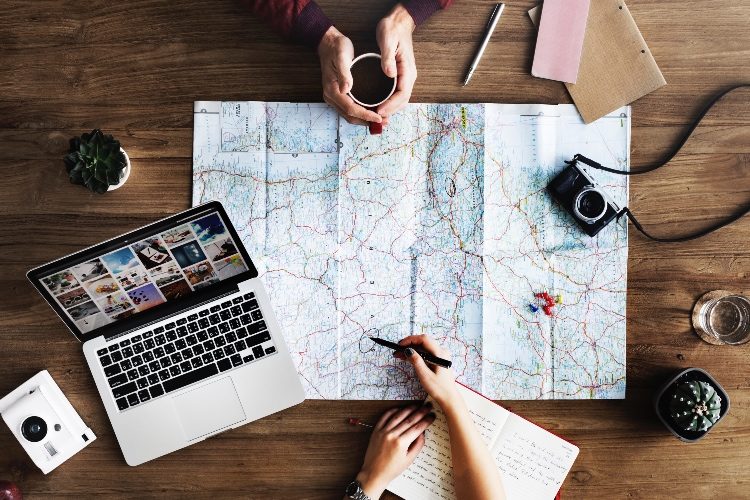As students and young adults, I’m sure that we are all trying to spend the least amount of money possible while still living and enjoying life. But one thing that many people are hesitant about is traveling, because they are afraid of spending money. However, travel does not have to be expensive. There are countless ways to save money that still allow you to venture off and see the world. In this article, I will reveal 10 methods that I and many others have used while traveling that are guaranteed to save you money. Keep this information handy, and use it to buy your next adventure!
1. Book through cheap airfare booking websites
Some airfare websites have cheaper airline tickets than others, and oftentimes the deals are much better. If you are under 26, studentuniverse.com offers great deals for young people and/or students. Other websites that have amazing deals are skyscanner.com, expedia.com and kayak.com. Remember to check the flight that you want through different websites and compare the prices.
2. Stay in a hostel or Airbnb
Of course, hotels are the safest and easiest options ,but they are without a doubt the most expensive option for accommodation. Staying in a hostel or Airbnb can save you half the money or even more. The pros to staying at a hostel is that you can meet new people and even travel with them. And depending on the Airbnb you select, it might even have more amenities than hotels.
3. Use public transportation
You should only use Uber or taxi when absolutely necessary. Most cities will have some sort of public transportation, which you should definitely take advantage of. It’s cheap, and depending on the city, they might have options for unlimited transportation pass for 24 hours, 48 hours, etc. Just make sure to get familiar with how the city’s public transportation works.
4. Look for free things to do
The beauty of exploring a city is that it doesn’t have to be expensive. In fact, there are probably so many free things to do. You can visit the tourist info office or ask hotels, hostels, or your Airbnb host about free things to do in the city. Sightseeing is one of the easiest and cheapest things to do. Parks and monuments are often free. In addition, you should do research on which places have free admission. For example, many museums are free on certain days.
5. Eat smart
Avoid eating at “fancy restaurants” or restaurants that are very close to tourist attractions because these tend to be very costly. Instead, try to look for places that have lunch/dinner specials or include a whole meal for a good price. Food is one of the things that can either make or break your wallet, so try to find the most affordable options. If it comes down to it, you can always eat at fast food restaurants, but don’t forget to try some local food as well.
6. Create a budget
Create a budget, and do your best to stick to it. In doing so, you don’t spend more than you need to. For example, you can create a daily budget of $60. $25 for food, $15 for souvenirs, $20 for attractions. Of course, this will vary depending on what you want to do for the day. So before budgeting, you might have to also do some research. However, it will help in the long run when you are able to stick to your budget and be smart with your money.
7. Compare souvenir shops
Most souvenir shops sell the same things for a range of prices. But why pay $5 for a keychain when you can pay $3? When I go souvenir shopping, I like to check out a shop and look at something, such as a keychain or a magnet, and see the price. Then, I go to a couple more shops and see the same items, and compare the prices. If I notice one shop sells the same keychain or magnet for cheaper, chances are that the prices for everything else in that shop is cheaper than the rest.
8. Get a good travel credit card
While traveling, you should always check with your bank to make sure the card you’re using doesn’t charge international transaction fees because these can really add up. Instead, your bank probably has some kind of travel card option, where you do not get charged international transaction fees when you make a purchase. Some good travel cards I would recommend are Chase Sapphire Preferred and Bank of America Travel Rewards credit card.
9. Do not exchange your currency at the airport
Airports are notorious for their insane conversion rates. As a former victim of this myself, I once lost over $80 on just exchanging money alone. My advice would be to exchange a couple foreign bills before your trip, just so that you have cash to pay for the first few things you do in the country, such as transportation or food. Then, as you are walking around the city, I guarantee that there will places for currency exchange that are much more reasonable than the airport. In my opinion, airport money exchange should only be used in emergencies.
10. Travel in low season
Despite the fact that the weather may not be as favorable in low season, there are pros of traveling in low season. First, flights during low season can be significantly cheaper, saving you hundreds of dollars. I recommend downloading a flight tracker app, such as Hopper, which predicts when you should buy flights to get the cheapest option. In addition, traveling in low season means less tourists and crowds, which can make your travel experience that much better.

